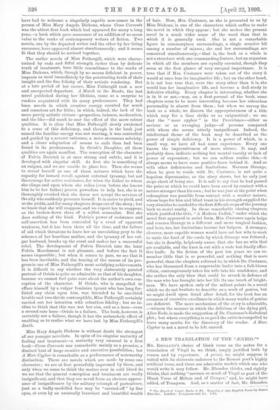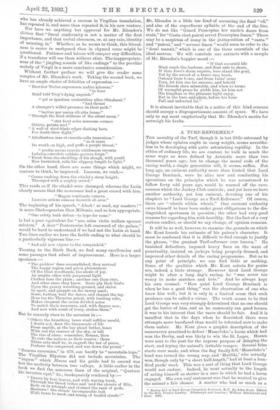A NEW TRANSLATION OF THE ".2ENEID."*
Mn. RHOADES'S choice of blank verse as the metre for a translation of -Virgil is, we think, amply justified both by reason and by experience. A priori, we might suppose it suited with its elaborate cadences to the Roman poet's highly artificial verse, and there are admirable models which one who would write it may follow. Mr. Rhoades thinks, and rightly thinks, that nothing savours so much of Virgil as part of the Blank Verse of Milton and of Cowper," and, he might have added, of Tennyson. And, as a matter of fact, Mr. Rhoades, • The lEneid of Varga, Books L. VT. Trauslatuil into English Verso by James Rhoades. London : Longmans and Co. 193. who has already achieved a success in Virgilian translation, has repeated it, and more than repeated it, in his new venture. Nor have we anything but approval for Mr. Rhoades's dictum that "lineal conformity is not a matter of the first importance, and that verbal closeness, or, at any rate, identity of meaning, is." Whether, as he seems to think, this literal- ness is easier in unrhymed than in rhymed verse might be questioned. Patience and labour will conquer any difficulties, if a translator will use them without stint. The inappropriate- ness of the "jingling sounds of like endings" to the peculiar melody of Virgil is a more conclusive consideration.
Without further 'preface we will give the reader some samples of Mr. Rhoades's work. Taking the second book, we have an ample choice of felicities of expression :— " Breviter Troiae supremum audire laborem."
"to hear Brief told Troy's dying anguish."
" qui se ignotum venientibus nitro Obtulerat."
"had thrust A stranger's wilful presence on their path."
"tacitae per arnica silentia lunae." "Through the kind stillness of the silent moon."
" stat fern acies mucrone corusco Stricta, paints neci " "A wall of steel-blade edges flashing bare, For death-blow dight."
"Attollentem irae et caerula colla tumentem."
" as it mass Its wrath on high, and puffs a purple throat."
" positis nevus exuviis nitidusque invents Lubrica convolvit sublato pectore terga." "Fresh from the shedding of his slough, with youth New burnished, rolls his slippery length to light."
On the other hand, there are some things which might, we venture to think, be improved. Laocoon, we read,— " Comes rushing down the citadel's steep height, Thronged with a mighty crowd."
This reads as if the citadel were thronged, whereas the Latin clearly means that the newcomer had a great crowd with him.
"Magna comitante caterva Laocoon ardens sumths, decurrit ab arce."
'The beginning of his speech, " Alack ! so mad, my masters !" is more Shakespearian than Mamie, and so less appropriate.
"One safety hath defeat—to hope for none."
is but a poor equivalent for " una salus victim nullam sperare salutem." A door "Postern wise left rearward of the palace," would be hard to understand if we had not the Latin at hand. Two lines earlier we have the feeble ending to what should be a particularly vigorous line :— "And add new vigour to the vanquished."
Turning to the Sixth Book, we find many excellencies and some passages that admit of improvement. Here is a larger specimen :—
"The goddess' dues accomplished, they arrived
The happy region and green pleasaunces Of the blest woodlands, the abode of joy.
An ampler ether with purpureal light Clothes here the plain ; another sun than ours, And other stars they know. Some ply their limbs Upon the grassy wrestling-ground, and strive In sport, and grapple on the tawny sand ; Some, footing, beat the dance, and °haunt the lay. Here too the Thracian priest, with trailing robe, Makes eloquent the seven divided notes To match their measures, and, with fingers now,
And now with comb of ivory, strikes them."
But he scarcely rises to the occasion in :— "Others the breathing brass shall softlier mould,
I doubt not, draw the lineaments of life From marble, at the bar plead better, trace With rod the courses of the sky, or tell The rise of stars : remember, Roman, thou To rule the nations as their master : these Thine artEkshall be, to engraft the law of peace, Forbear the conquered, and war down the proud."
" Snmma cacumina," in 678, can hardly be "mountain-tops." The Virgilian Elysinm did not include mountains. The " iugum" which lEneas and his guide had to ascend was bbat the acclivity between two valleys. A little earlier in the
ook we find the sonorous lines of the original, " Quatuor hIC invectus equi," Sce., inadequately rendered by :—
" Drawn by four horses, and with waving torch, R rough.the Greek tribes and 'mid the streets of Ells,
ode on in triumph and claimed the rank of gods Madraan ! the clouds' incomparable bolt With brass to mock and tramp of hoofed steeds !"
Mr. Rhoades is a little too fond of accenting the final " ed," and also of the superfluous syllable at the end of the line. We do not like "Guard Proserpine her uncle's doors from stain," for Casta vicet patrui servet Proserpina limen." There may be a suspicion of irony in the juxtaposition of " casta "
and "patrui," and " servare limen "would seem to refer to the " domi mansit," which is one of the three essentials of the ideal matron. We will conclude our extracts with a sample of Mr. Rhoades's happier mood :—
"If that accursed life Must roach the harbour, and float safe to shore, If thus Jove's doom require, here stand the goal, Yet by the sword of a brave race beset, Outcast from home, and from lulus' arms Torn, lot him sue for succour, and behold His friends slain miserably, and when to terms Of wrongful peace he yields him, let him not His kingdom or the pleasant light enjoy, But in the bare mid-plain, before his hour Fall and unburied lie."
It is almost inevitable that in a notice of this kind censure should occupy a disproportionate amount of space. We have only to say most emphatically that Mr. Rhoades's merits far outweigh his faults.







































 Previous page
Previous page